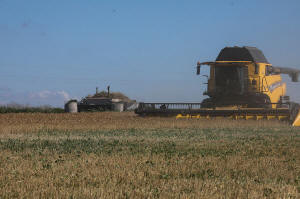Ukraine boosts grain exports despite intensified Russian attacks
 Send a link to a friend
Send a link to a friend
 [August 12, 2024] By
Pavel Polityuk, Jonathan Saul and Tom Balmforth [August 12, 2024] By
Pavel Polityuk, Jonathan Saul and Tom Balmforth
KYIV/LONDON (Reuters) - Ukraine is scrambling to ship as much grain as
it can this summer, taking advantage of military gains it has made in
the Black Sea area to boost exports even as Russia has attacked its
ports.
Ukraine is a major global wheat and corn grower and before Russia's
invasion in 2022 the country exported about 6 million tons of grain
alone per month via the Black Sea.
Grain sales are a crucial revenue source and while global prices are
weak, Ukraine's cash-strapped farmers have little choice but to push
ahead with exports because they need to fund the next winter sowing
season.
Ukraine doubled food exports in July to over 4.2 million metric tons
from the same month last year, according to data from Ukraine's UGA
traders' union, despite intensified Russian attacks on Odesa, a key
Black Sea export hub, and Izmail, a major port along the Danube River
taking grain into Europe.
Ukraine has not yet reported the destinations of its exports in July,
but last season it exported most of its wheat to Spain, Egypt and
Indonesia, with its corn mostly heading for Spain and China.
The surge comes despite this season's drop in output caused by
war-related disruptions, and there is no guarantee that Kyiv can sustain
the trend into the full 2024/25 season.

"We are doing everything to make business feel comfortable even in
wartime conditions," Dmytro Barinov, deputy head of Ukraine’s Seaport
Authority, told Reuters.
The exports are a combination of new season wheat plus corn from stocks
following last year's bumper harvest.
So far, Ukraine has exported 3.7 million tons of agricultural goods in
July through Odesa and 569,000 tons via the Danube, export data showed.
That compared with 291,000 tons via Odesa and 2.07 million tons through
the Danube in July 2023.
There were six shipments of corn from Ukraine's other two operational
Black Sea ports of Chornomorsk and Pivdennyi in June and July to
Rotterdam, Europe's busiest port, and Spain's Cartegna, separate LSEG
shipping data showed.
Since July, Ukraine has also shipped cargoes to China, Egypt and Turkey,
separate data from Kpler showed.
Despite last month's stronger sales, overall exports for the 2024/25
season are expected to fall because of unfavorable weather and the war's
impact, the ASAP agricultural consultancy said.
"We expect that grain exports from Ukraine could plunge by 14.5 million
tons per year and touch almost a decade low of 35 million tons," ASAP
said.
PORTS TARGETED
Ukraine has managed to create a shipping corridor after a U.N.-backed
Black Sea grain export initiative collapsed last year. Russia's Black
Sea Fleet has been forced to move nearly all its combat-ready warships
from occupied Crimea to other locations.
While the improved security situation has lowered insurance and freight
rates, making exports more competitive, Kyiv's challenge is to ensure
its ports that are accessible can ship out cargoes.
Ukraine has sustained multiple missile and drone attacks in recent
weeks, some of which have targeted Odesa and Izmail.
Even as ships have so far avoided any major damage, Ukrainian officials
say port infrastructure is being targeted.
"The Russians are well aware of that and they're hitting the weak
spots," said Barinov with Ukraine's Seaport Authority.
[to top of second column] |

An agricultural worker operates a combine during wheat harvesting in
a field, amid Russia's attack on Ukraine, in Kharkiv region, Ukraine
July 6, 2024. REUTERS/Vyacheslav Madiyevskyy/File Photo

"They're hitting with precision missiles, they're deliberately
destroying our ability to export, to process."
Barinov and other shipping officials said Russia was avoiding
strikes at the international sea lanes outside of Ukrainian port
limits, keeping escalation contained.
Ukraine’s military assists ships entering and exiting ports, with
captains operating under specific safety instructions, the country's
navy chief Vice-Admiral Oleksiy Neizhpapa told Reuters.
"Ukrainian air defense forces cover these corridors and ports. All
assets, from air defense groups to missile systems along the coast,
contribute to this effort,” Neizhpapa said.
Nonetheless, Ukraine has to cope with a multitude of other
difficulties, including energy blackouts that disrupt port
operations and exports.
Munro Anderson, head of operations at marine war risk and insurance
specialist Vessel Protect, part of Pen Underwriting, said Russian
strikes at targets inside Ukraine while less frequent than earlier
in the war, continued to pressure Kyiv.
"Such attacks persist in applying pressure on the commercial
maritime environment in Ukraine and thus achieve the Russian intent
of eroding Ukrainian ability to fully capitalize on the potential
output from these ports."
Additional war risk premiums for ships entering Ukrainian ports have
been quoted in recent months at up to 1.2% of the value of the ship
with discounts that could mean a lower rate, insurance sources said.
Those premiums spiked to as much as 3% in November after a missile
strike damaged a ship in Pivdennyi.
This still works out at hundreds of thousands of dollars in
additional estimated costs for a seven-day voyage and those costs
could increase if security conditions deteriorated.
Industry sources said war underwriters were keeping the situation
under review in the light of the recent attacks.
"Increased shelling of ships in corridor ports may prompt reinsurers
to revise their war risks insurance rates," said Maksym Dubovyi,
managing partner with insurance broker Atria.

During its year of operation, Ukraine's sea corridor has enabled
2,059 ships to deliver 57.7 million tons of cargoes to 46 countries,
including 39 million tons of agricultural products, said Neil
Roberts, head of marine and aviation at the Lloyd’s Market
Association, which represents the interests of all underwriting
businesses in the Lloyd's of London insurance market.
"Individual underwriters will decide the rate as appropriate in the
light of events and take their own view on the risk."
(Reporting by Jonathan Saul and Tom Balmforth in London, Pavel
Polityuk in Kyiv; Editing by Tomasz Janowski)
[© 2024 Thomson Reuters. All rights
reserved.]
This material may not be published,
broadcast, rewritten or redistributed.
Thompson Reuters is solely responsible for this content.
 |